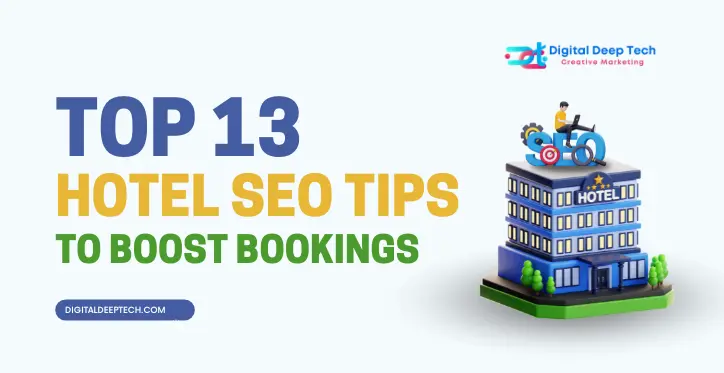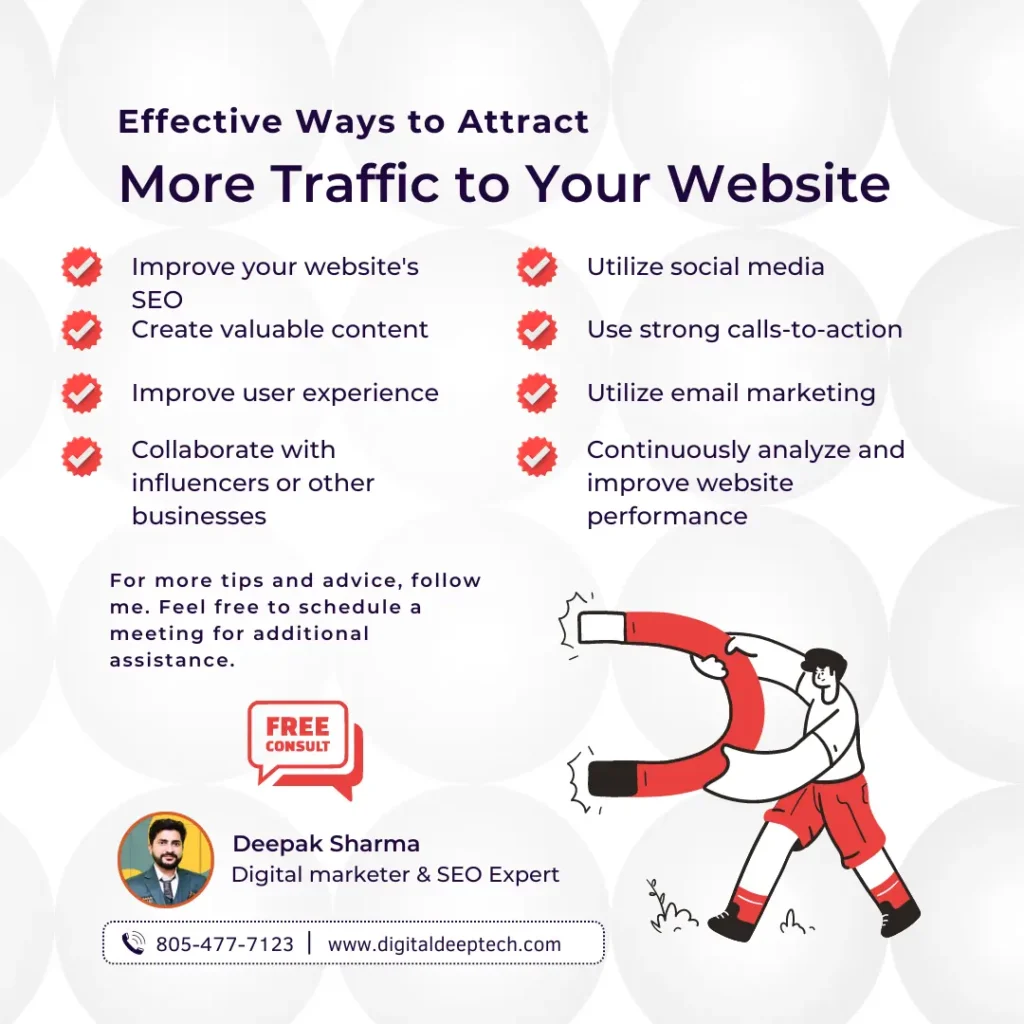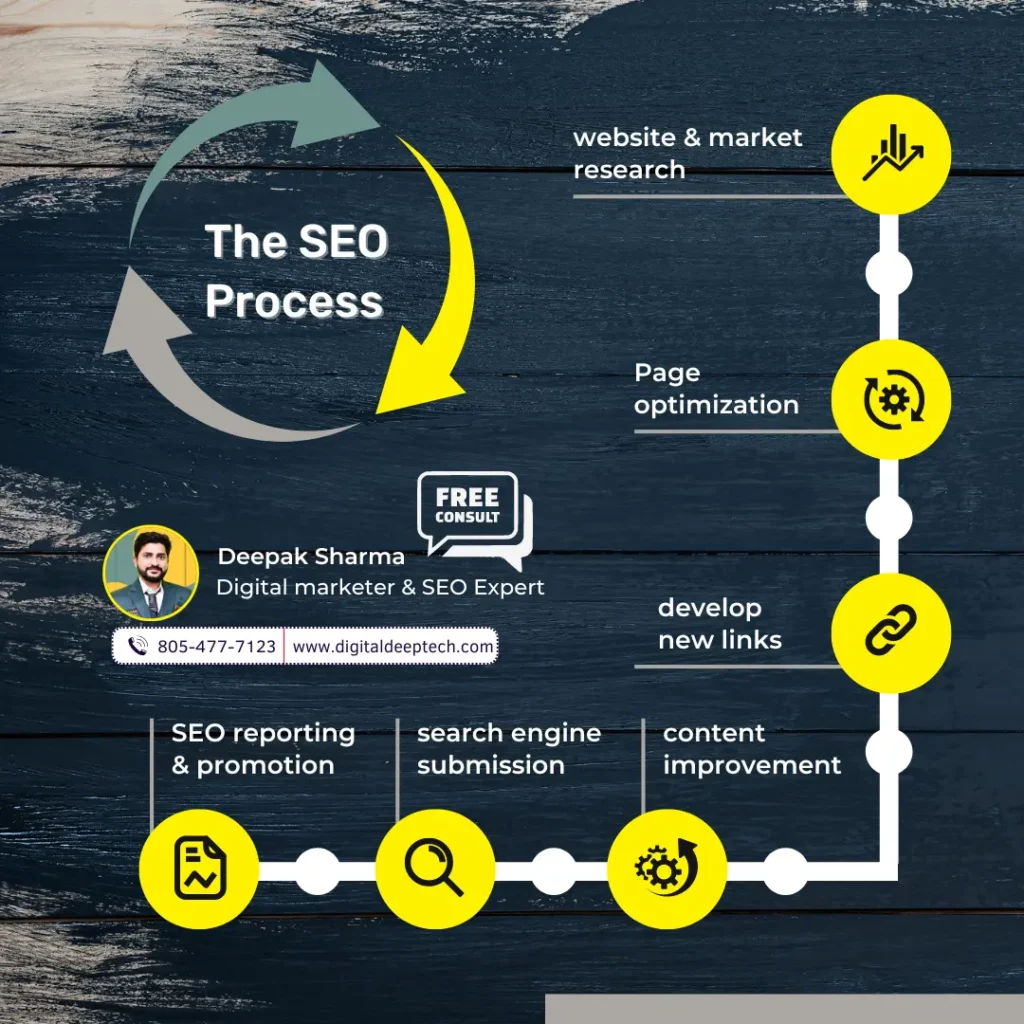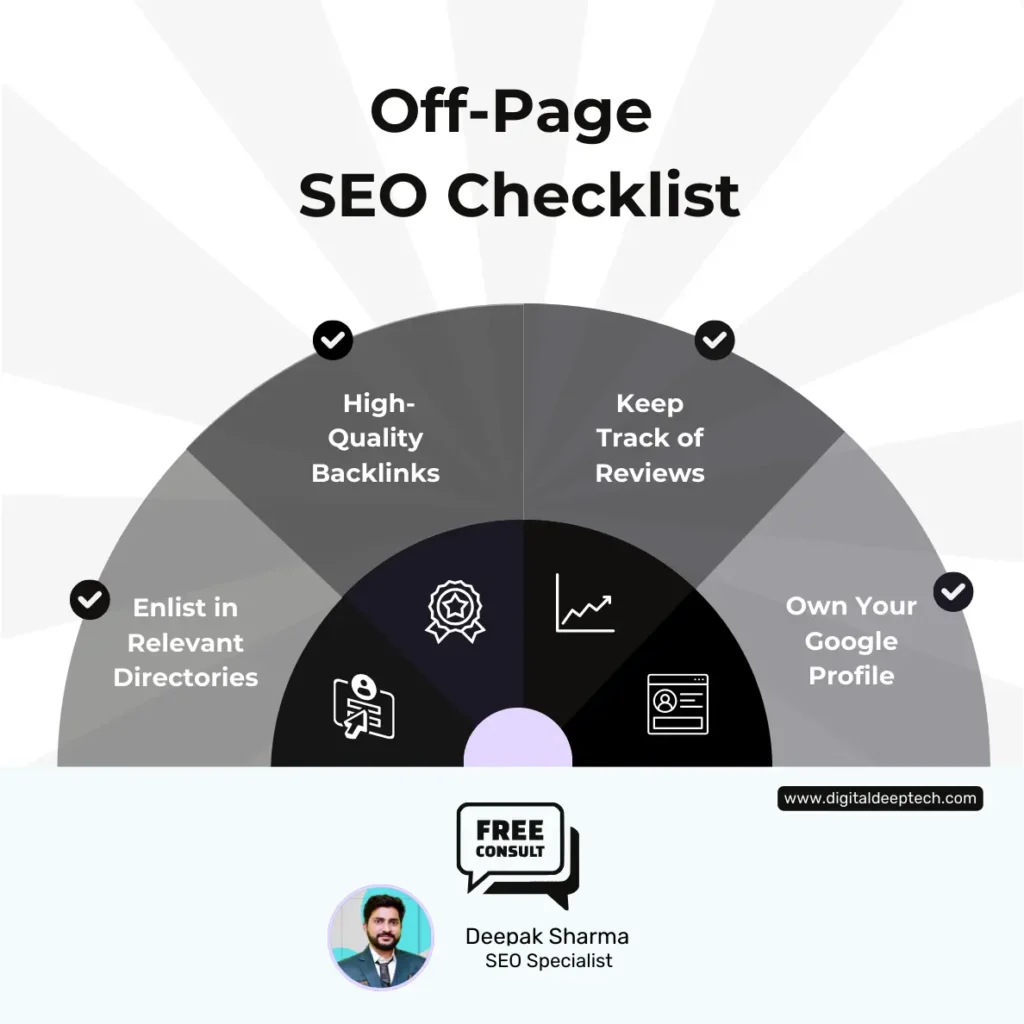13 Proven Hotel SEO Tips to Boost Bookings

Table of the content
In today’s changing era, a lot of importance is given to online marketing. If a hotel and resort want to remain at the top of search engine result page (SERP) for a long time, then Search Engine Optimization (SEO) plays a major role.
Travelers who are interested in visiting hotels, first do online research and see what kind of facilities they are providing and at what price. Having a good online presence can bring a lot of leads for the hotels and serviced apartments. So does your hotel resort rank on the search engine page? If not, this hotel SEO guide is getting a lot of tips and tricks, which you can implement on your website and make a mark in your digital marketing.
Why You Need SEO for the Hotel Industry?
If a traveler searches on a search engine with the keyword “hotel resort near me,” see that there are many big competitors on the first page. Seeing this, you will feel that it is impossible to beat these competitors, but it is not so. Bringing your hotel website to the search engine results page is not that difficult.
A traveler searches for a hotel resort for a booking by entering different types of queries on the search engine. By analyzing their search terms, you can rank your website for other hotel SEO keywords. This is a little difficult, but not impossible. Doing SEO for hotel websites can generate more leads. Let’s see why Search Engine Optimization for hotels is important.
First of all, it is a cost-effective digital marketing solution that we use to stay online for a long time. It is also affordable for hotels and resorts when compared to other online marketing solutions.
With hotel Search Engine Optimization, you can bring your target audience to your website, which will give you potential traffic and help in lead generation.
When a hotel website starts ranking on Google, its visibility and authority increase. The customer’s trust in your brand increases, due to which the customer does not hesitate to take advantage of your services.
Hotel SEO vs Paid Ads: When your keyword gets ranked on top of search engines, consistent traffic starts coming. This does not happen in paid ads. As soon as your ad is closed, the traffic stops coming. But through search engine optimization, continuous traffic can be brought to your website by getting it ranked at the top.
Let's Discuss Your Project
Get a free one-month consultation and share your vision for digital marketing with us.
The Impact of SEO on Hotel Websites
What impact will hotel Search Engine Optimization have on a website? Let’s see this in detail. Suppose your competitors are in a stronger position on ground level than you, but through SEO for beach resorts and hotels, you can represent your services better than them.
First of all, it is important to understand what queries your local travelers are making on search engines regarding their vacation bookings. We call them search-terms or keywords.
- Selecting such keywords, whose search volume is high and competition is low.
- Publishing content on hotel websites, and optimizing those keywords in the content.
The impact of best hotel SEO extends beyond mere visibility; it’s a gateway to targeted traffic and enhanced conversions. By strategically employing target keywords, websites ensure their content resonates with the wanderlust of users actively seeking hotel-related information. Mobile optimization and a focus on local SEO for hotels further amplify the effectiveness, catering to the on-the-go nature of hotel inquiries.
In this changing era, search engines keep their results in a better position for users. For this, they have to constantly make changes to their algorithm. Understanding this, hotel websites also have to be optimized to make them user-friendly, according to the search engine.
SEO for hotels and resorts is a continuous process. Once the keyword gets ranked, it remains consistent for a long time, but if it is not optimized consistently, then this ranking also goes down. So, to understand this, we have to stay up-to-date.

Why do we need Hotel Search Engine Optimization?
95% of hotel traffic comes from websites that are ranked from 1 to 5 on the search engine. This result is going to pay off. Therefore, in today’s time, almost hotels want to rank their websites at the top of Google.
When any user comes to search engines to find hotels, they check the first two or three websites and get the booking from there. Therefore, Hotel SEO marketing becomes very important.
The reason behind this is that how you rank hotel websites within a particular location is important for local hotel website SEO. These hotel SEO tips and tricks will help you make an impact on your online presence.
Rank Higher: Hotel SEO Tips

- To improve the ranking of your website, optimize it according to the relevant queries on the search engine result page.
- To increase brand awareness of the hotel business, keep publishing content related to your business, such as case studies, hotel guides, adventure tips, and more.
- To bring organic traffic to your website from search engines, do not just create website pages but also keep adding user-interested blogs to your website.
- To attract leads from your website, add call-to-action contact forms in your contact form so that users can fill out the form and avail bookings.
- To always stay ahead of competitors, you should continuously improve your SEO strategy.
Using all these methods, you can boost your return on investment (ROI) on a low budget.
Why Hotel SEO Matters?
In today’s era of digital marketing, every business is trying to get ahead of each other. The hotel industry also participates in this competition to grow their businesses online. So what could be the reason that there is a great need for hotel websites? Let’s discuss hotel SEO tips and tricks to make your website SEO-friendly.
1. Increasing Online Visibility and Keyword Ranking
Bringing organic leads through hotel Search Engine Optimization is another goal. But to get leads, it is very important to get organic traffic on the hotel website. Traffic will come only when the keywords of the hotel website appear in the top rankings of Search Engines.
To understand it more carefully, we can say that organic traffic is linked to the ranking of keywords, and leads are linked to organic traffic. Other benefits is that, after keyword ranking, online presence also increases, which also increases brand awareness.
2. Targeted Right Traffic Using Buyer Persona
Search engine optimization is not just about getting traffic; it’s about getting the right traffic.
Hotel SEO is not just about attracting traffic; it’s about drawing the right guest audience. Understanding users’ search intent allows hotel websites to tailor their content to meet specific needs. This not only results in increased traffic but also fosters meaningful engagement. A well-optimized hotel website captures the desired audience’s attention, leading to higher conversion rates and a more satisfied user base.
To generate meaningful engagement from organic traffic, it is important to target the right audience through hotel SEO. The focus should be on genuine traffic, not just traffic. This can only happen when we know our target audience’s pain points, recruitment, problems, desires, location, and age.
3. Credibility and Trustworthiness
In the hotel industry, where trust is paramount, SEO is pivotal in establishing credibility. Securing a prominent spot in search results positions a website as an authoritative source. As users associate higher search rankings with credibility, a well-executed hotel SEO strategy enhances the perceived trustworthiness of a website, influencing potential travelers in their decision-making process.
4. Competition in the Hotel SEO
The search engine aims to provide the best results to its users. It ranks only those websites at the top of Google whose domain authority, trustworthiness, and credibility are high. It is possible to rank a hotel website at the top of Google through search engine optimization for a long time. The question arises: on which keywords should the hotel website be ranked? If the competition for the keyword is low and there is enough volume, then the keyword can be brought to the top of the SERPs in a short time.
To beat your competitors in the hotel industry, metrics are essential. For this, you get online tools such as SEMrush and Ahref, on which you can check your competitor’s website and analyze the statistics of their website. In this way, you can make a result-oriented SEO plan for the future.
Best Hotel SEO Practices be applied to Every Website
Many search factors work to rank a hotel website at the top of the search engines. Here we will discuss different SEO practices that you can apply to your hotel business website and do better than your competitors.
1. Keyword Research for the Hotel Industry
Keyword research plays an important role in search engine optimization. Keyword research helps you analyze how long your website will be able to rank in search engines. To understand keyword strategy in a simple way, focus on three factors:
- High search volume
- Low keyword difficulty
- Good traffic potential
To make a good keyword research strategy, use free tools like Google Keyword Planner, SEMrush, Ahref, Moz, and many more.
After understanding the user queries, focus on long-tail keywords and optimize them in your content. Don’t do keyword stuffing. Make sure your content is valuable; your keyword strategy shouldn’t break the wall of quality. Always provide solution-based and informative content to your target audience to make a trustworthy impression.
2. Link-Building Strategies for the Hotel SEO

Is it possible that, apart from search engines, you can get traffic from other websites? Yes, it is possible. We can do this by creating quality backlinks.
Getting backlinks from high-authority hotel websites has an impact. Search engines notice from where all the backlinks are received on your website. Enhance search engine ranking and website authority by getting quality backlinks from websites related to your niche, such as the hotel industry.
Hotel businesses emphasize creating backlinks in large quantities; this should not be done. Focus on the quality of the backlink, not the quantity of backlinks.
Use hyperlinks to increase the ranking of keywords. Use the right anchor text for that particular keyword in your context.
3. Local SEO Strategy for Hotels
To target travelers in your area, you need to improve the visibility of your website among local visitors. For this, create and optimize a Google My Business profile. For this, add map details to your profile, keep optimizing it, and keep adding content to it.
This strategy will prove to be game-changing for capturing a local audience. Put accurate information in the GMB profile and add location-based keywords. By doing this, you can target the right audience and come on top of Google Maps. This will bring traffic directly from Google to your website, and visitors can contact you directly and take advantage of your service.
We also take customer reviews on Google My Business; this will increase your credibility, authority, and trustworthiness.
4. Mobile Optimization for Hotel SEO
With increasing awareness of technology, the use of smartphones is also increasing. Travelers are able to easily book their trips on their smartphones. To easily access your website on any device, it is necessary to make it mobile-friendly.
For this, make your website mobile-responsive so that the user can have a good experience. To increase its loading speed, optimize the images of the website design, minimize unnecessary elements, and implement touch-friendly navigation so that the user can easily explore your website.
A mobile-friendly website also has a positive impact on SERPs. The search engine gives more priority to mobile-friendly websites. Ensure that users stay on your website for longer. If your website takes time to load, users will leave very quickly, and the bounce rate will have a negative impact on search engine rankings.
5. Content Marketing Tips for Hotel SEO
It is said that content is the king, but in today’s changing era, content is everything. Provide valuable, engaging, informative, and actionable content to your hotel users so that they stay on your website for a long time. Use multimedia on the website to enhance the user experience. Do not focus on the quantity of content; focus on the quality of content.
Don’t think from the point of view of a hotel resort; look from the perspective of a traveler. What kind of content is there on your website? Is that content able to provide a good solution for travelers?
Keywords play an important role in increasing the quality of content. While doing research, make a list of your target keywords and add them to the content with a good strategy. Do not focus on keyword stuffing. You have to ensure that you are writing the content for your users and not for search engines.
Keep publishing regular blogs on your hotel website. What new technologies are coming in the hotel industry, stay updated on them. Which destinations does your service take travelers to? Keep publishing related content on your website. What are you offering separately to your customers? Keep highlighting it in the content. Keep publishing blogs on new topics, which will keep your presence in the eyes of search engines, and new traffic will keep coming to your website.
6. Social Media Promotion for Hotel SEO
Social media is one of the fastest-growing trends in today’s world. It is often seen that travelers update their content on social media platforms such as Instagram, Twitter, and Facebook. So to stay integrated with them, you should also focus on social media promotion.
Create an account on social media platforms related to your business and keep sharing on social media that is related to your business. This will increase your chances of getting new customers.
Create a hotel SEO strategy to publish content on social media. For this, create a weekly-monthly calendar in which you must post different types of content topics on social media. So that the audience’s engagement remains and they can contact you through your profile, which will increase your bookings.
To use social media platforms, add keywords related to your services to your content, which will increase your search appearance. Secondly, add hashtags to your content that should be related to the hotel industry.
You can increase the organic traffic to your website through social media as well as through SEO, which will help influence communication online, increase brand awareness, and attract new customers easily.
7. Improve User Experience (UX) and SEO for Hotel Websites
Bringing traffic to a hotel website through search engine optimization is one thing. The other aspect is that when a user comes to your website, how long does he stay on your website? To reduce the bounce rate of your website, you should focus on the user experience (UX).
If the user is satisfied with your hotel website, it has a direct impact on the keyword ranking. To improve the user experience (UX), the website should focus on mobile response, fast loading times, and user-friendly navigation. The content of the website should be according to the queries of the travelers and satisfy them fully. Use multimedia properly on your website, which will make your website attractive and increase user engagement.
Use Call-to-Action (CTA) buttons at various places on the website pages so that the user can click on them and go to the direct booking page and confirm the booking.

8. Technical SEO for Hotel Websites
Keywords rank in search engines only when the search engine crawls and indexes your website. Technical SEO for resorts websites also becomes important for this reason. For this, keep the URL structure of your website efficient and clean. Ensure that it contains a focus keyword. Add schema markup to your website so that search engines can get detailed information about it.
Optimize the speed of the website, which will lead to fast loading. Keep doing regular technical SEO audits so that the performance of the website can be improved by identifying technical issues. These issues have a direct impact on your search engine rankings. It is important to fix them on time. Ensure that your website is well-optimized and has a good visual appearance so that you remain on top in the eyes of search engines.
9. Optimize Voice Search for Hotel SEO
In today’s changing era, travelers want to make quick queries and get results. Voice search takes less time and effort, while typing is the opposite. Travelers have a different way of expressing their queries on search engines, while typing has a different way. Due to the growth of technology, search engines are now focusing more on voice search than typing. Search engines are constantly changing their algorithms to improve their results, keeping in mind the user’s queries.
For voice search optimization, you should optimize your content on long keywords like ”best hotels to find local food in San Diego” while not focusing on “local food in San Diego.” Answer the Public and Google Trends are important tools for finding long phrases on which you can search for hotel-related queries.
For Local SEO for hotels, submit your business to all local directories so that it can be easily found on search engines. Submit your business to local sites on important websites like Google My Business, Yelp, Bing, and more.
Be sure to add an FAQ section to your hotel website pages that answers your hotel audience’s queries. This is a valuable resource for boosting your voice search rankings. Try to answer hotel-related questions in a concise and informative manner.
10. Conduct Competitor Analysis for Hotel SEO
Competitor analysis is an important step in the search engine optimization of a hotel website. To analyze your top competitors, you can use SEO tools like SEMrush, Ahref, Moz, and more. This will help you analyze your competitors’ online presence, their content, and their hotel SEO keyword strategy. This will help you understand what you can do better than them to make your content even better. Along with this, analyze the backlink strategy of the competitors.
To analyze your competitors, enter your main keywords in the search engine and keep the top 3 websites that appear in the search results. It becomes more important to analyze what your competitors are doing to achieve success. For this, a good competitor analysis strategy is required.
To analyze the content of competitor websites, make an audit. Identify what kind of content and topics they are creating on their website, such as blog posts, destination guides, videos, photographs, etc. Along with this, analyze the content gap. Identify in which areas your competitors are lacking. Keeping those topics in mind, publish unique and valuable content for your website and make it SEO-friendly.
11. SEO-Friendly Content Strategy for Hotel Blogs
Keep publishing new blogs on the new trends coming in the hotel industry. Analyze your competitor’s website to see what kind of content they are writing. You can find new topics by using SEO-free tools and AI tools such as ChatGPT and Microsoft Copilot.
Use quality images, infographics, and short videos in the context of the blog to increase its visibility. Use alt-text to define the images. This will also help images rank higher on search engines. Publish your content to gain the trust of your audience, which will be important in your future business.
To stay up-to-date with the trends in the hotel industry, you can use digital tools. Search on Google Trends to explore hotel destinations, activities, and hotel styles and understand the audience’s interests. This tool will give you valuable insight into your audience’s interests.
12. Optimizing Multimedia for hotel SEO
Along with optimizing the text in the website content, it is also important to optimize the multimedia so that the presence of the website is maintained. Optimizing images and multimedia, such as short videos, is another good hotel SEO strategy. Keep the file name and alt-text of the multimedia with relevant keywords so that accessibility can be improved. Make the website design responsive. Use multimedia elements to create high-quality visuals that will lead to good engagement.
13. Monitoring and analyzing Hotel SEO performance
While running a Hotel SEO strategy, analyze and monitor the results weekly or monthly. Check whether that strategy is working or not. To monitor and analyze the website, you can use free SEO tools like Google Analytics and Google Search Console. These will help you track metrics, check organic search, keyword ranking, user engagement, and more.
Find out in which areas of improvement. Along with this, keep optimizing your website according to the trends of the hotel industry and the changing algorithms of the search engine. So that the strategy keeps changing along with it. This will maintain your presence in digital marketing, and you will be able to easily beat your competitors in search engine rankings.
Conclusion:
The user’s interest in their queries on search engines has been increasing continuously. Ignoring this, the hotel industry is busy optimizing its website.
In this blog, we have mentioned the need and practice of such Hotel SEO tips and practices, with which any hotel resort and tour operator can optimize their website and get an important place in search engine ranking.
From keyword research to content optimization techniques, we have discussed them deeply. This blog will help you make the hotel website user-friendly and search engine-friendly by understanding each aspect well.
If you want the help from a freelance digital Marketer, from Digital Deep Tech provides you with the best solutions on a limited budget. Contact them now for an online meeting. We understand your need and are capable of taking you to a next level with the search results.
What is hotel SEO and why is it important for my business?
Hotel SEO involves search engine optimization, which means enhancing a website belonging to a hotel to rank better on search engines. The significance here is that the hotel website can drive more organic traffic, boost visibility, and more or less generate more bookings and income.
How does SEO help my hotel to stand apart from all others?
SEO can help your hotel stand out by improving your search engine rankings, enhancing your online presence, and ensuring that your website shows up in searches related to your industry. This way, it’s easier for potential guests to find your hotel compared to competitors.
What are the key SEO strategies for hotels?
Perhaps the most prominent general SEO strategies that hotels can employ include website optimization for mobile, the use of local SEO tactics, quality content, well-worked keywords, and the creation of backlinks from authoritative sites.
How many days does Hotel Search Engine Optimization require?
SEO is a long-term strategy. It usually takes 3 to 6 months to get any visible results, although sometimes it can be different based on many other factors, such as competition, the present state of your web page, and the quality of the SEO work in progress.
How much do online reviews help my hotel's SEO?
Reviews are an important part of SEO. If there are good reviews, the hotel is reputable and ranks higher in searches. Positive reviews from happy clients play a significant role in the success of your SEO strategy.
Why is hotel SEO content important?
Content is the lifeblood of SEO. High-quality, relevant content can help you attract website visitors, keep them on your site for longer periods, and improve your search rankings. Maintaining your blog with high-quality information will also boost your SEO.
In what ways can I optimize the website for my hotel locally?
Checks on the consistency of the NAP (name, address, and phone) of the hotel on various online platforms, claims and optimizes the Google My Business listing, includes local keywords, and encourages local reviews.
What are the best keywords for my hotel's SEO?
Nowadays, many travelers book hotels on the move, and hence mobile optimization is very important. Apart from that, a mobile-friendly website improves user experience, reduces bounce rates, and is favored by search engines—thus it boosts your SEO.
Should I invest in paid search ads in addition to SEO?
SEO combined with a paid search campaign will make you leverage the best of both worlds. In this sense, SEO helps in building long-term organic traffic; paid spy ads can quickly deliver or yield instant visibility and traffic. Both of these tactics combined can help in leveraging the most organic traffic for you, leading the way toward more reach and bookings.

About the Author
Deepak Sharma is the founder of Digital Deep Tech and a renowned SEO and digital marketing expert with over a decade of experience. Passionate about helping businesses enhance their online presence, Deepak specializes in creating SEO strategies that drive traffic and generate leads.





